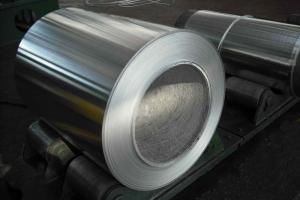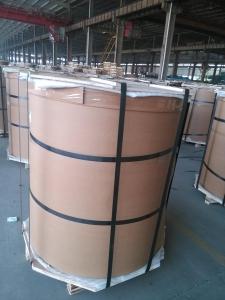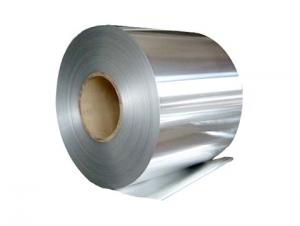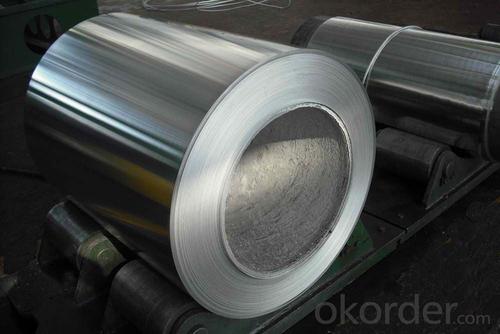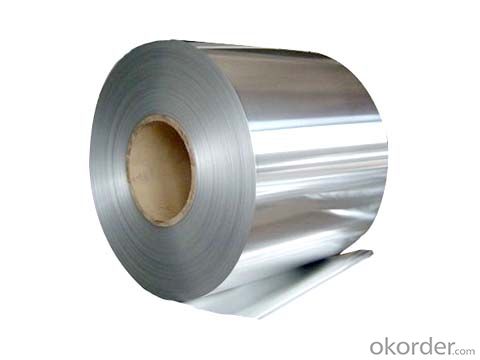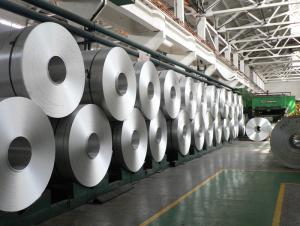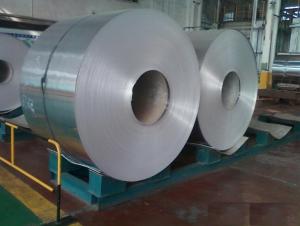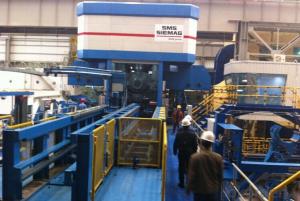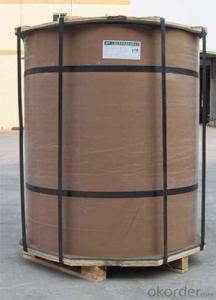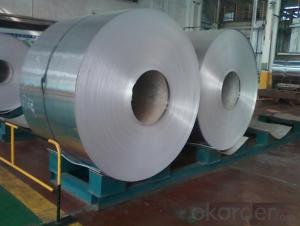Aluminum Sheet Metal Coil - Direct Casting Aluminium Foil Stock in Coil AA8019
- Loading Port:
- China Main Port
- Payment Terms:
- TT or LC
- Min Order Qty:
- -
- Supply Capability:
- -
OKorder Service Pledge
OKorder Financial Service
You Might Also Like
1.Structure of Product Description
Direct Continuous Aluminium Foil Stock in Coil is one semi-finished aluminium material. This strip can be rolled down to aluminium foil. It is widly used in the production of light guage foil, pharmaceutical foil, household foil,container foil ect.
2. Main features of the product
a.Competitive price---We have our own mills and can produce mill finished aluminium coils, so we can control the production cost better.
b.Professional after-sale service---We have more than 15 years exportation experience and you need not worry about the exporation problems.
c.Fast delivery time---We can control the delivery time within 35 days.
3.Image
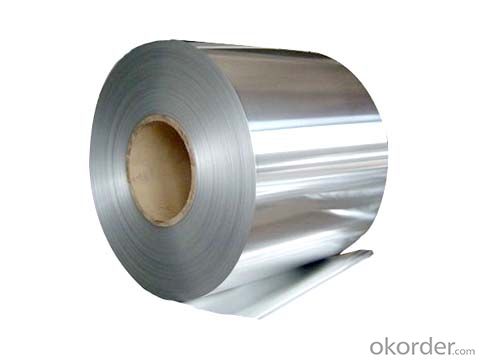
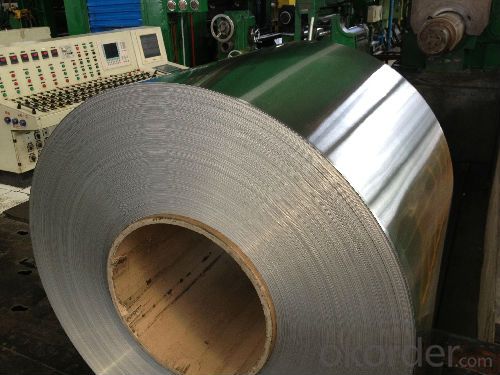
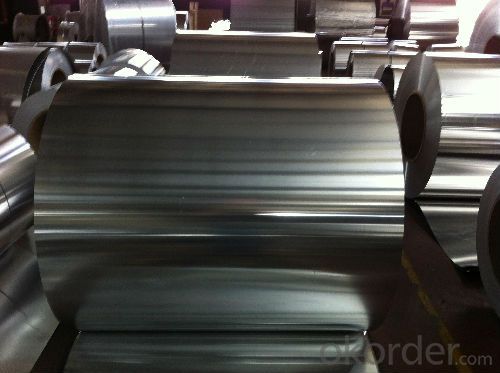
4.Products Specification
| Alloy | Temper | Surface | Profile | Coil ID |
| AA8079 | H14 | Free of defeats | -0/+1% | 405mm |
5. FAQ
What is the quality standard?
---Usually our standard is GB3880-2006
What is the largest width?
---It is 2300mm
What is the MOQ?
---Usually we can accept 80 tons.
- Q: What is color aluminum coil?
- The base plates are all aluminum, but the surface has been colored.
- Q: What are the common surface treatments for aluminum coils in the automotive industry?
- Aluminum coils in the automotive industry undergo various surface treatments to improve their performance and appearance. Some popular treatments include anodizing, painting, cladding, clear coating, and polishing/buffing. Anodizing is a widely used treatment that forms a protective oxide layer on the surface of the coils. This is achieved by immersing the coils in an electrolytic solution and applying an electric current. Anodizing enhances corrosion resistance, durability, and allows for dye or paint application. Painting is another option for aluminum coil treatment, providing both aesthetics and protection against environmental factors. Coils are coated with either solvent-based or powder paint, offering an appealing appearance and safeguarding against scratches and UV radiation. Cladding involves bonding a layer of aluminum alloy with different properties onto the coil's surface. This treatment is commonly employed to enhance strength, thermal conductivity, or corrosion resistance. Cladding methods can include hot rolling, cold rolling, or explosive bonding. Clear coating is often applied to aluminum coils to create a transparent protective layer. This coating prevents corrosion, oxidation, and discoloration, while preserving the natural metallic appearance. Polishing and buffing are surface treatments that aim to improve the smoothness and shine of aluminum coils. Imperfections, scratches, and oxidation are mechanically removed through grinding or polishing. These methods are often used for decorative purposes in high-end automotive applications. These are merely a few examples of the surface treatments available for aluminum coils in the automotive industry. The choice of treatment depends on factors such as desired appearance, performance requirements, and environmental conditions the coils will face.
- Q: what is aircraft grade aluminum?
- Military Grade Aluminum
- Q: What are the different thickness options for aluminum coils?
- The thickness options for aluminum coils can vary, but common thicknesses range from 0.019 inches to 0.125 inches.
- Q: What are the vibration damping properties of aluminum coils?
- Aluminum coils have good vibration damping properties due to their inherent stiffness and damping capacity. The material's high density and low modulus of elasticity allow it to absorb and dissipate vibrations effectively, reducing the transmission of energy through the coil. This makes aluminum coils ideal for applications requiring vibration control and noise reduction.
- Q: How heavy and long is the aluminum rolling on average?
- On average it is 5 or 6 tons, and you can weigh specific ones. The length = weight/(width*thickness*density).
- Q: What are the different surface treatments available for aluminum coils?
- There are several surface treatments available for aluminum coils, each with its own benefits and applications. Some of the common surface treatments include: 1. Mill Finish: This is the standard untreated surface of aluminum coils. It has a dull appearance and is suitable for applications where aesthetics are not a priority, such as industrial or structural uses. 2. Anodizing: Anodizing is an electrochemical process that creates a protective oxide layer on the surface of aluminum coils. This treatment enhances the corrosion resistance, durability, and appearance of the coils. Anodized aluminum coils are commonly used in architectural applications, such as building exteriors or window frames. 3. Paint Coating: Aluminum coils can be coated with various paints to improve their appearance, protect against corrosion, and provide additional functionality such as heat reflection or insulation. Paint coatings can be applied in different thicknesses and finishes, ranging from standard coatings for general use to specialized coatings for specific applications like automotive or aerospace industries. 4. Brushed Finish: This treatment involves brushing the surface of aluminum coils with abrasive materials to create a textured finish. Brushed aluminum coils have a distinct pattern and are often used in decorative applications, interior design, or signage. 5. Embossed Finish: Aluminum coils can be embossed with patterns or textures to enhance their appearance or improve their functionality. The embossing process alters the surface of the coils, creating a raised or recessed design. Embossed aluminum coils are commonly used in architectural, automotive, or packaging applications. 6. Laminating: Aluminum coils can be laminated with various materials, such as films or foils, to provide additional protection, insulation, or decorative effects. This treatment can enhance the appearance, durability, or functionality of the coils, depending on the type of laminating material used. These are just a few examples of the surface treatments available for aluminum coils. The choice of treatment depends on the specific requirements of the application, such as aesthetics, corrosion resistance, durability, or functionality. It is important to select the appropriate surface treatment to ensure the desired performance and longevity of the aluminum coils in their intended use.
- Q: Can aluminum coils be painted for custom designs?
- Yes, aluminum coils can be painted for custom designs. Painting aluminum coils allows for endless possibilities in terms of customization and aesthetics. The coils can be painted with various colors, patterns, and designs to suit individual preferences and requirements. The paint application process involves cleaning the surface, applying a primer, and then applying the desired paint or coating. By painting aluminum coils, it is possible to create unique and eye-catching custom designs for a range of applications, including architectural elements, signage, automotive parts, and more. Additionally, the paint helps protect the aluminum from corrosion and enhances its durability.
- Q: I know that Aluminum is a metal, and it's corrosive, but I've been wondering about how Aluminum Foil is created. Is it the same as the metal? Just pounded down? or is it a mixture of different elements?
- Aluminum is brought to a factory in blocks about a foot thick and is slowly pushed through many massive rollers along a conveyor belt while lubricant is sprayed over the whole machine, then at the end it is sucked into giant rolls to be taken off to other places to be made into commercial aluminum foil or used as insulation in machines. The next part is more stuff that veers away from your original question: Aluminum is the 13th element in the periodic table, and it comes after magnesium and before silicon. So it is in fact its own element, and therefore is used in alloys with some other elements. Aluminum foil was originally invented by NASA to be used for their own purposes, but then was made for the public as many of their inventions have been over the years.
- Q: i dont want aluminum cookware, but how about a stainless steel set with an aluminum core. Is this the same as aluminum pots and pans? Thanks.
- The aluminum is encased in the stainless steel, usually as a thick disk in the bottom. It is an excellent conductor of heat and holds the heat well once it gets hot. All you see is the stainless, none of the aluminum because it's between two layers of stainless in the bottom of the pots. You are right, you don't want food cooked in straight aluminum, some metal taste can transfer to certain foods. That won't happen with stainless.
Send your message to us
Aluminum Sheet Metal Coil - Direct Casting Aluminium Foil Stock in Coil AA8019
- Loading Port:
- China Main Port
- Payment Terms:
- TT or LC
- Min Order Qty:
- -
- Supply Capability:
- -
OKorder Service Pledge
OKorder Financial Service
Similar products
Hot products
Hot Searches
Related keywords
